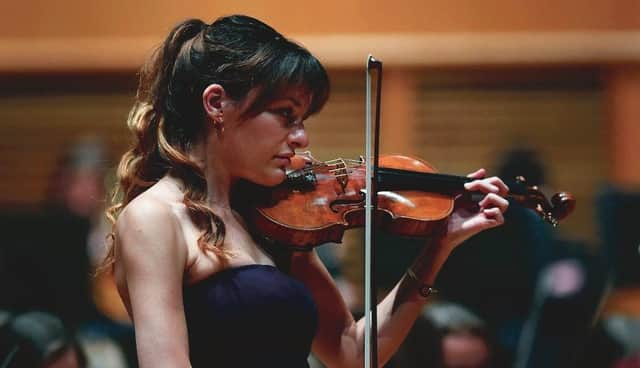Nicola Benedetti joins the greats to record Elgar’s Violin Concerto


One of the many daunting challenges facing any violinist tackling a new recording of Elgar’s 1910 Violin Concerto is the illustrious lineage of past recordings. Complete versions date back to 1929, and notable interpreters include Yehudi Menuhin (twice), Jascha Heifitz, Ida Haendel, Igor Oistrakh, Nigel Kennedy (twice), and more recently James Ehnes and Tasmin Little. That’s a lot to live up to.
It hasn’t fazed Nicola Benedetti, however, who has been performing it live over the past few years and now feels the time is right to commit her own thoughts to disc.“There are a few standout recordings, but there’s a lot I don’t really understand about the way others have interpreted it,” the Ayrshire-born star reveals. “I have my own very clear ideas of how I hear it and now feel confident in getting those down on record.”
Advertisement
Hide AdAdvertisement
Hide AdThe resulting album, in which she teams up with the London Philharmonic Orchestra and conductor Vladimir Jurowski, and which includes three shorter Elgar works for violin and piano – Salut d”Amour, Sospiri and Chanson de Nuit, with pianist Petr Limonov – is released digitally on 15 May. Physical CDs won’t appear until coronavirus restrictions are eased.
The first thing to note in Benedetti’s version is how bold and brassy it is. Phrases that might seem deliciously subdued in the 15-year-old Menuhin’s historic 1929 recording with Elgar himself on the podium, or liquid gold in Kennedy’s 1997 version with Simon Rattle, now possess a gravelly resonance. It’s as if she sets out deliberately to avoid the willowy sentimentality so often associated with Elgar.
Is there a danger of such lavish expression ripping the heart out of a piece often thought to allude to a covert amorous infatuation in Elgar’s life? “I have never heard Elgar speak of the personal note in his music except in regard to the concerto,” Charles Sanford Terry once said of his composer friend, whose teasing inscription in the score – taken from Alain-René Lasage’s picaresque novel Gils Blas – reads in translation: “Herein is inscribed the soul of …..”.
Whose soul? Theorists have poured over likely suspects. Was it Alice Stuart-Wortley, the daughter of painter Everett Millais, whom Elgar openly adored and nicknamed “Windflower,” annotating some of the concerto’s tenderest themes by that very name? Or was it Helen Weaver, to whom he was once briefly engaged? Other potential candidates have been mooted, all of whom had one thing in common: a five-letter first (or pet) name that coincides with the puzzling dots in the inscription. Whatever, Elgar held to his promise to his wife never to reveal “the secret of the five dots.”
Regardless of the muse, there’s no denying the impassioned, personalised power of this piece, its exorbitant orchestration, the almost superhuman demands it places on the soloist.
Ultimately, Benedetti reckons you can take or leave the personal stuff. “I’m not so intrigued by the answers to the questions raised by Elgar’s inscription as those on how he felt and expressed himself, how his feelings on love were manifest.”
Such leanings towards the dispassionate are reflected in this recording, one of intrepid positivity, impetuous optimism and a gutsy avoidance of nostalgia that will possibly grate with Elgar purists, but delight those who deem his music a little too rich for their digestive system.
Advertisement
Hide AdAdvertisement
Hide AdClear-mindedness and steely opulence operate at every level of Benedetti’s playing, giving Jurowski plenty of freedom to open the orchestral floodgates without overwhelming the soloist. That, in itself, is a welcome eye-opener.
As to how this interpretation sits within the canon of existing recordings, Benedetti fans will adore its openness and honesty, which freely interprets Elgar’s painstaking instructions, while others may miss, in such evocative moments as the soloist’s pivotal opening phrase, the soulful linear perfection of previous interpretations.
That Benedetti is capable of delivering such sustained delicacy is illustrated in the three shorter works that complete this disc, especially the timeless calm of Sospiri, heard here in its original piano-accompanied form.
But this album is primarily about the Violin Concerto and what Benedetti has to say about one of the repertoire’s greatest musical challenges. When she performed it with the RSNO in 2017, I wrote this would probably not be her final say on it. Indeed, like Menuhin and Kennedy, I can see an older Benedetti returning to it with fresh thoughts in years to come.
.
Nicola Benedetti’s recording of Elgar’s Violin Concerto with the London Philharmonic Orchestra’s is released digitally by Decca on 15 May.